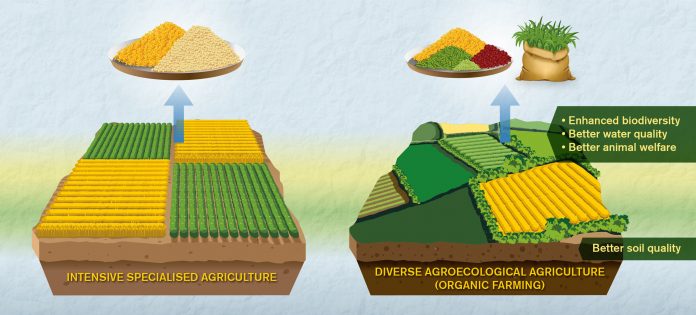The environmental effects of agriculture and meals are hotly debated. But essentially the most widely used manner of research steadily has a tendency to fail to remember essential factors corresponding to biodiversity, soil quality, pesticide affects and societal shifts, and those oversights can lead to mistaken conclusions at the merits of in depth and natural agriculture. This is in line with a trio of researchers writing in the magazine Nature Sustainability.
The maximum common manner for assessing the environmental affects of agriculture and food is the life cycle evaluation (LCA). Studies the use of this method every so often declare that natural agriculture is actually worse for the climate as it has decrease yields, and due to this fact makes use of more land to compensate. For instance, a contemporary find out about in Nature Communications that made this claim was once extensively reported via many publications.
However, 3 researchers from France, Denmark and Sweden have presented a meta-analysis of many LCA research in the journal Nature Sustainability, and say that this implementation of LCA is just too simplistic, and overlooks the advantages of organic farming.
“We are apprehensive that LCA provides too slender an image, and we risk making dangerous decisions politically and socially. When evaluating organic and extensive farming, there are wider effects that the present approach does no longer adequately believe,” says Hayo van der Werf of the French National Institute of Agricultural Research.
Biodiversity, for example, is of necessary importance to the health and resilience of ecosystems. But globally, it is declining. Intensive agriculture has been proven to be probably the most primary drivers of damaging traits similar to insect and hen decline. Agriculture occupies more than one-third of world land area, so any links between biodiversity losses and agriculture are hugely necessary.
“But our analysis presentations that current LCA studies infrequently factor in biodiversity, and as a result, they typically pass over that wider advantage of natural agriculture,” says Marie Trydeman Knudsen from Aarhus University, Denmark. “Earlier research have proven that organic fields make stronger biodiversity ranges approximately 30% higher than conventional fields.”
Usage of insecticides is some other issue to believe. Between 1990 and 2015, pesticide use international has increased 73%. Pesticide residues in the ground and in water and meals may also be harmful to human health, terrestrial and aquatic ecosystems, and cause biodiversity losses. Organic farming, in the meantime, precludes the use of synthetic insecticides. But few LCA studies account for those effects.
Land degradation and lower soil high quality due to unsustainable land control is also a subject matter—again, one thing hardly measured in LCA research. The benefits of organic farming practices, such as numerous crop rotation and the usage of natural fertilizers, are often overlooked in LCA studies.
Crucially, LCA most often assesses environmental affects in keeping with kilogram of product. This favors intensive programs that may have lower impacts per kilogram, whilst having higher impacts in keeping with hectare of land.
“LCA merely seems at the total yields. Of path, from that viewpoint, it is true that intensive farming methods are certainly simpler. But this is not the whole story of the larger agroecosystem. a Various panorama with smaller fields, hedgerows and numerous plants gives different benefits—greater biodiversity, for example,” says Christel Cederberg of Chalmers University of Technology, Sweden.
LCA’s product-focused means additionally fails to capture the subtleties of smaller diverse techniques which are extra reliant on ecological processes and adapted to native soil, local weather and ecosystem characteristics. LCA wishes a extra fine-grained means.
“We continuously take a look at the effects on the world meals chain level, however we need to be a lot better at considering the environmental results on the local level,” says Marie Trydeman Knudsen.The researchers note in their find out about that efforts are being made on this space, but much more development is needed.
an Additional key weak point is when hypothetical “indirect results” are incorporated, comparable to assuming that the lower yields of organic agriculture lead to greater carbon dioxide emissions as a result of extra land is needed. For instance, every other outstanding learn about—from a researcher also based at Chalmers University of Technology—instructed that organic agriculture was worse for the local weather because the requirement for more land leads indirectly to much less wooded area space. But accounting for those indirect effects is problematic.
“For instance, believe the rising call for for organic meat. Traditional LCA studies would possibly simply suppose that overall consumption of meat will remain the same, and therefore, extra land can be required. But consumers who’re motivated to buy organic meat for environmental and ethical causes will most probably also purchase fewer animal-based products within the first place. But rarely any studies into this sort of consumer habits exist, so it is very difficult to account for some of these social shifts now,” says Hayo van der Werf.
“Current LCA method and follow is simply not excellent enough to evaluate agroecological systems similar to organic agriculture. It due to this fact needs to be improved and built-in with different environmental review equipment to get a extra balanced image,” says Christel Cederberg.


